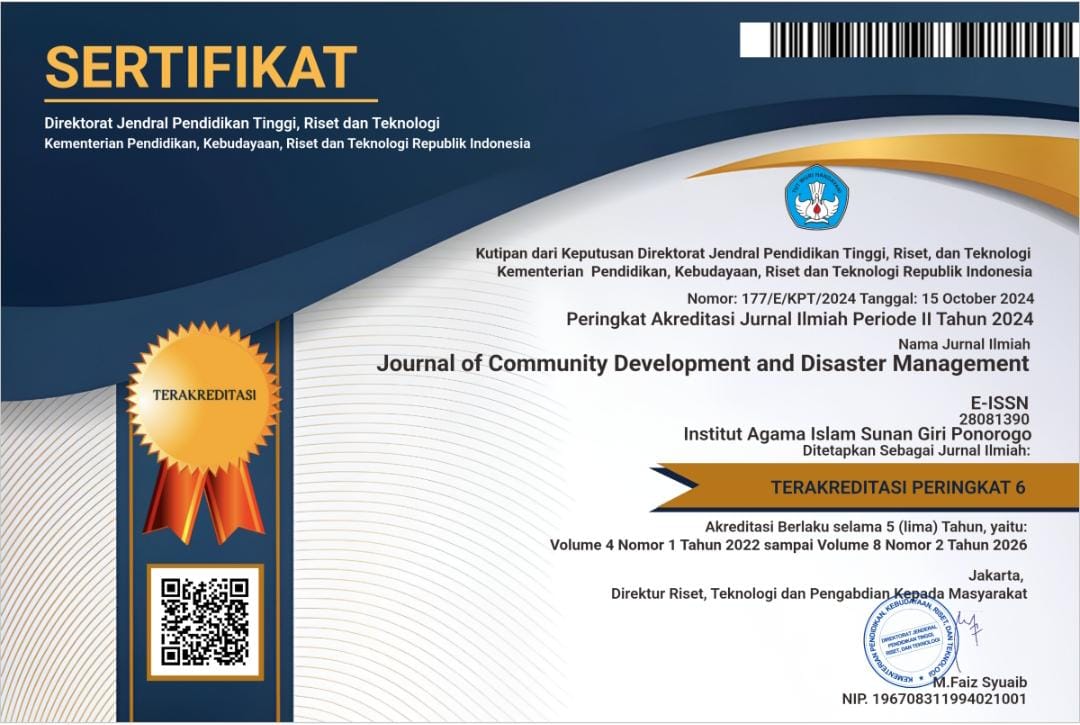Pelatihan Manajemen Keuangan Syariah untuk Guru dan Murid di MI Arrazaq Islamic School Rumbai Pekanbaru
Sharia Financial Management Training for Teachers and Students at MI Arrazaq Islamic School Rumbai Pekanbaru
DOI:
https://doi.org/10.37680/jcd.v7i1.7542Keywords:
Islamic Financial Management, Students, TeachersAbstract
The purpose of this community service is to improve literacy and sharia financial management skills for teachers and students at MI Arrazaq Islamic School Rumbai Pekanbaru through applicable and contextual training based on Islamic values. This community service uses the ABCD (Asset-Based Community Development) approach to empower teachers and students of MI Arrazaq Islamic School in managing sharia finances based on community potential. The activities are carried out through four stages: Discovery (identification of school assets), Dream (formulation of shared ideals), Design (preparation of two-day training for teachers and students), and Destiny/Delivery (implementation of training and follow-up). As a result, the training was effective and resulted in a sustainability plan such as the formation of sharia financial ambassadors and sharia-based student cooperatives. The results of the training program showed that the ABCD approach was effective in exploring and empowering school community assets. The training succeeded in increasing teachers' and students' understanding of the principles of sharia finance in an applicable manner. The formation of the Sharia Financial Ambassador Team and the plan for a sharia-based mini cooperative are real manifestations of the sustainability of the program. Overall, this program is able to form an Islamic economic culture that is integrated into learning and daily life at school.
References
Ali, N., & Saputri, A. A. I. (2025). Revitalisasi Hukum Keluarga Islam untuk Memberdayakan Ekosistem Ekonomi Syariah yang Adil: Perspektif Normatif dan Socio legal. Citizen: Jurnal Ilmiah Multidisiplin Indonesia, 5(3), 747–758.
Amalia, N., & Yulianingsih, S. (2020). Kajian Psikologis Humanistik Abraham Maslow Pada Tokoh Utama Dalam Novel Surat Dahlan Karya Khrisna Pabichara. Imajeri: Jurnal Pendidikan Bahasa Dan Sastra Indonesia, 2(2), 149–156.
Anggraini, M., Nusrida, H., & Kamarni, N. (2022). Pola Prilaku Konsumsi Muslimah Generasi Z Terhadap Produk Trend Fashion (Studi Kasus Mahasiswi Uin Imam Bonjol). Jurnal Ekonomika Dan Bisnis Islam, 5(3), 52–64.
Budiono, I. N., Arifin, A., & Harfiana, F. (2023). Meningkatkan Literasi Keuangan Syariah Melalui Pelatihan Sistem Operasional Perbankan Syariah Bagi Guru dan Siswa UPTD Sman 5 Parepare. MAKKARESO, 11–21.
Dewi, F. K., Sari, D., & Saripudin, U. (2025). Transisi Perilaku Konsumen Islami: Tinjauan Terhadap Tren Belanja Online Di Era Digital. Ekonomica Sharia: Jurnal Pemikiran Dan Pengembangan Ekonomi Syariah, 10(2), 375–390.
Fathoni, T., & Muqorrobin, S. (2024). Development of the Creative Economy of the Village Karang Taruna Community Based on YouTubers and Microstokers. Amalee: Indonesian Journal of Community Research and Engagement, 5(1), 61–74.
Fauzul‘Adziima, M. (2021). Psikologi Humanistik Abraham Maslow. Jurnal Tana Mana, 2(2), 86–93.
Haikal, M., Akbar, K., & Efendi, S. (2024). Prinsip-Prinsip Hukum Ekonomi Syariah Dalam Undang-Undang Perbankan Syariah. MAQASIDI: Jurnal Syariah Dan Hukum, 26–39.
Hendiana, R., & Aly, A. D. (2016). Transaksi jual beli online perspektif ekonomi islam. Al-Mustashfa: Jurnal Penelitian Hukum Ekonomi Syariah, 3(2).
Insani, F. D. (2019). Teori Belajar Humanistik Abraham Maslow Dan Carl Rogers Serta Implikasinya Dalam Pembelajaran Pendidikan Agama Islam. As-Salam: Jurnal Studi Hukum Islam & Pendidikan, 8(2), 209–230.
Jafar, M. K., Anggrainy, N. E., Suhardin, I., & Tohai, R. N. (2023). Gaya Hidup dan Perilaku Konsumtif Remaja di Manado. Maqrizi: Journal of Economics and Islamic Economics, 3(2), 96–105.
Jah, J. I. (2024). konsep halal haram dalam ekonomi islam. J-EBI: Jurnal Ekonomi Bisnis Islam, 3(02).
Munirah, M., Asfahani, A., Fathoni, T., Cindy, A. H., & Hasan, Z. (2024). EMPOWERING WOMEN THROUGH ENTREPRENEURSHIP IN URBAN COMMUNITIES. Community Development Journal: Jurnal Pengabdian Masyarakat, 5(4), 6520–6527.
Pusvisasari, L., Bisri, H., & Suntana, I. (2023). Analisis Filosofi dan Teori Hukum Ekonomi Syariah dalam Konteks Perbankan Syariah. Jurnal Ekonomi Utama, 2(3), 269–277.
Ratu, B. (2014). Psikologi Humanistik (Carl Rogers) dalam Bimbingan dan Konseling. Jurnal Kreatif, 17(3), 12.
Rodiah, S., Ramashar, W., Ahyaruddin, M., Agustiawan, A., Marlina, E., Bidin, I., Putri, A. A., & Lawita, N. F. (2018). Peningkatan literasi keuangan melalui perencanaan keuangan keluarga. Jurnal Pengabdian UntukMu NegeRI, 2(1), 66–73.
Rufaida, E. R., Asnidar, A., Novitasari, E., & Alamsyah, A. (2024). Analisis Sistem Akuntansi Syariah melalui Rekonstruksi Landasan Pendekatan Normatif dan Historis pada Sistem Ekonomi Islam. Jurnal Hukum Ekonomi Syariah, 8(1), 32–51.
Sihotang, M. K., Hasanah, U., & Nasution, R. (2021). Penguatan Pemahaman Keuangan Syariah Bagi Guru Dan Siswa Madrasah Aliyah. Monsu’ani Tano Jurnal Pengabdian Masyarakat, 4(2), 160–173.
Sirait, W., Rohmah, S. N., Dinda, I., & Meliyani, M. (2025). Literasi Keuangan Syariah untuk Generasi Milenial dalam Menggunakan Produk Keuangan Halal. EKONOMIKA45: Jurnal Ilmiah Manajemen, Ekonomi Bisnis, Kewirausahaan, 12(2), 264–271.
Witjaksana, B., Purwanti, A., Fathoni, T., & Dewi, D. D. (2024). Increasiation Economic Management Literacy For The Community Through The Independent Entrepreneurship Program. Community Development Journal: Jurnal Pengabdian Masyarakat, 5(4), 6207–6215.
Yusuf, M. (2021). Pendidikan holistik menurut para ahli.
Downloads
Published
How to Cite
Issue
Section
License
Copyright (c) 2025 Febri Delmi Yetti, Syamsu Rizal Ahmad

This work is licensed under a Creative Commons Attribution-ShareAlike 4.0 International License.
JCD: Journal of Community Development and Disaster Management rekomendasi pencipta untuk memegang hak cipta tanpa batasan dan batasan pencipta untuk memiliki hak publikasi tanpa batasan, juga pemilik hak komersial atas artikel tersebut adalah pencipta.










